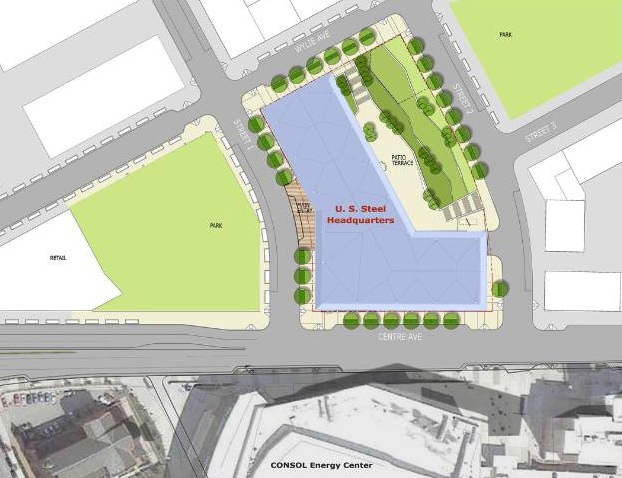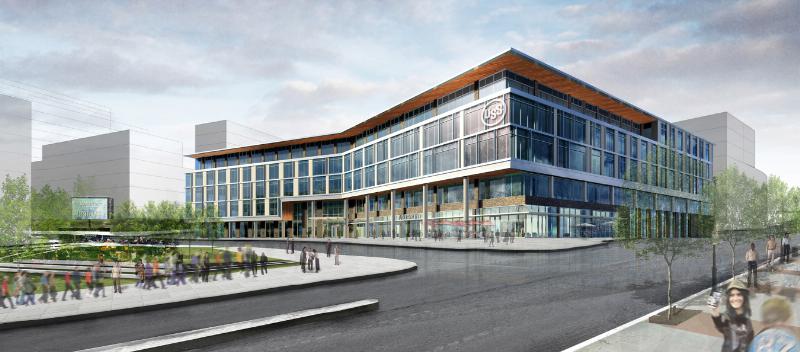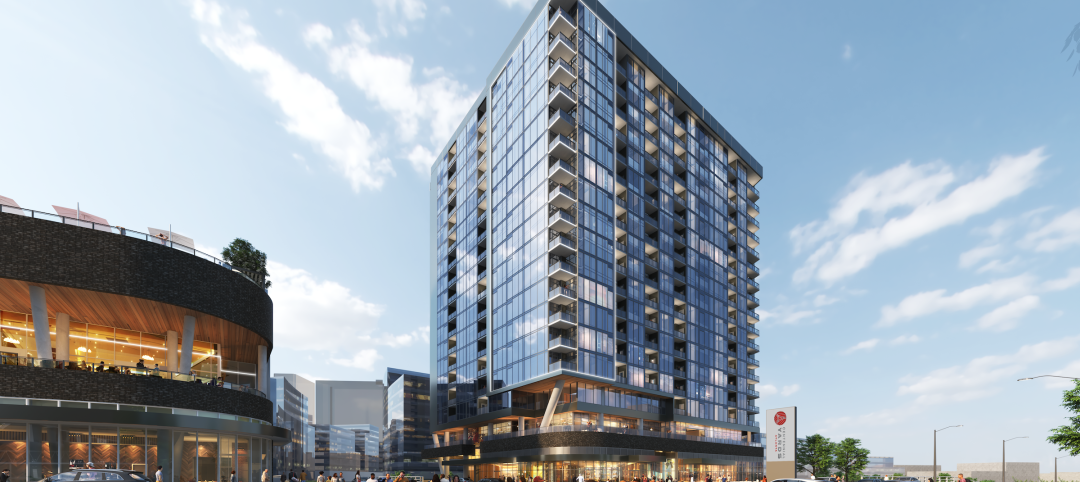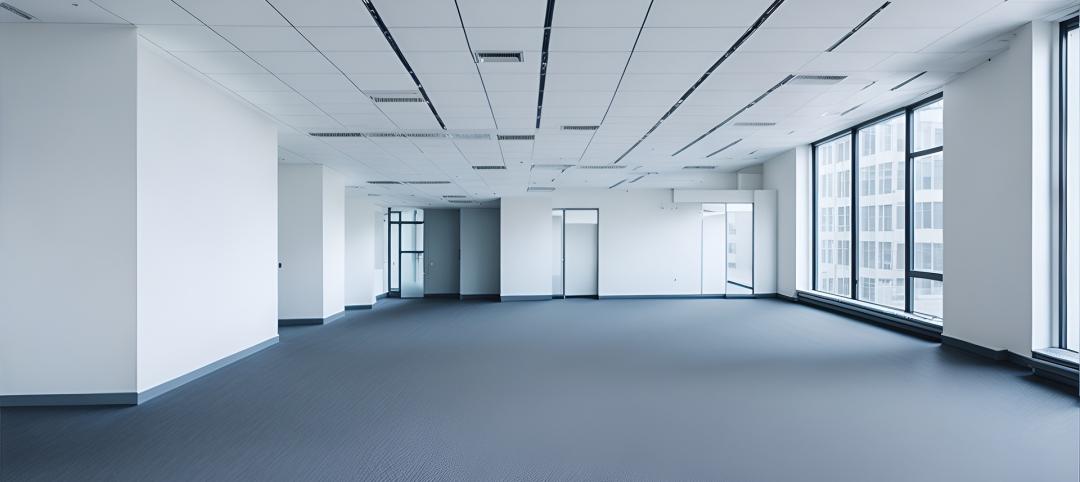U.S. Steel, which has operated in Pittsburgh for more than 100 years, plans to stay at least 18 more.
The giant steelmaker—which sold its 64-story U.S. Steel Tower headquarters in April 2011 and a year later announced it would move out of that building—has inked a deal with the Pittsburgh Penguins hockey franchise to build a five-story, 268,000-sf office building on the old Civic Arena site downtown, which the Penguins own.
A subsidiary of the Penguins and the team’s developer, St. Louis-based Clayco, will jointly own the new building, for which construction is scheduled to begin next summer and be completed by October 2017, around the time that U.S. Steel’s five-year lease on 450,000 sf in the U.S. Steel Tower expires. The projected cost of the new building was not disclosed.
U.S. Steel plans to move 800 employees from that tower and offices at Penn Liberty Plaza into 250,000 sf of the new building, which it will lease for at least 18 years, with an option to extend its lease beyond that. The rest of the space will be used for retail stores. The 2.25-acre site will include a museum highlighting Pittsburgh’s and U.S. Steel’s role in the worldwide steel industry.
The company’s decision to remain in Pittsburgh put an end to more than two years of speculation about where it might be headed. Indiana and Illinois reportedly were wooing U.S. Steel to relocate. U.S. Steel had also looked at several other buildings in different areas in and around Pittsburgh.

Site plan for U.S. Steel's new HQ, which will be located across from the Consol Energy Center, home of the Penguins NHL hockey team.
Several local news reports stated that it was Penguins’ CEO David Morehouse who convinced U.S. Steel’s CEO Mario Longhi to keep the company in Pittsburgh. The two chief executives met during a September 2013 barbecue at the home of the Penguins’ legendary player and co-owner Mario Lemieux. At that meeting, Morehouse impressed on Longhi that U.S. Steel was the “foundation upon which this city was built.”
Indeed, Pittsburgh’s Mayor Bill Perduto was on record saying “I didn’t want to be the Pittsburgh mayor to lose U.S. Steel.” Allegheny County Executive Rich Fitzgerald lobbied federal environmental, transportation, and trade officials on U.S. Steel’s behalf. And Pennsylvania Gov. Tom Corbett last month announced nearly $31 million in state grants to rehab three U.S. Steel plants in the state.
By agreeing to move into new digs, U.S. Steel would be the first corporate anchor tenant for a 28-acre Uptown site next to Consol Energy Center, where $440 million in development is planned, according to the Pittsburgh Tribune-Review and other news reports. That development would include retail, housing, and office space, and would be partially funded by more than $30 million in state grants and local tax-increment incentives, which would direct some of the development’s revenue to job training and other programs.
U.S. Steel has agreed to take only half of its potential abatements, with the rest of the incentives going to fund other parts of the Hill District, according to the Pittsburgh Post-Gazette.
Related Stories
Adaptive Reuse | Sep 12, 2024
White paper on office-to-residential conversions released by IAPMO
IAPMO has published a new white paper titled “Adaptive Reuse: Converting Offices to Multi-Residential Family,” a comprehensive analysis of addressing housing shortages through the conversion of office spaces into residential units.
Mixed-Use | Sep 10, 2024
Centennial Yards, a $5 billion mixed-use development in downtown Atlanta, tops out its first residential tower
Centennial Yards Company has topped out The Mitchell, the first residential tower of Centennial Yards, a $5 billion mixed-use development in downtown Atlanta. Construction of the apartment building is expected to be complete by the middle of next year, with first move-ins slated for summer 2025.
Healthcare Facilities | Sep 9, 2024
Exploring the cutting edge of neuroscience facility design
BWBR Communications Specialist Amanda Fisher shares the unique considerations and challenges of designing neuroscience facilities.
Office Buildings | Sep 6, 2024
Fact sheet outlines benefits, challenges of thermal energy storage for commercial buildings
A U.S. Dept. of Energy document discusses the benefits and challenges of thermal energy storage for commercial buildings. The document explains how the various types of thermal energy storage technologies work, where their installation is most beneficial, and some practical considerations around installations.
Office Buildings | Sep 5, 2024
Office space downsizing trend appears to be past peak
The office downsizing trend may be past its peak, according to a CBRE survey of 225 companies with offices in the U.S., Canada, and Latin America. Just 37% of companies plan to shrink their office space this year compared to 57% last year, the survey found.
University Buildings | Sep 4, 2024
UC San Diego’s new Multidisciplinary Life Sciences Building will support research and teaching in both health and biological sciences
The University of California San Diego has approved plans for a new Multidisciplinary Life Sciences Building, with construction starting this fall. The 200,000-sf, six-level facility will be the first building on the UC San Diego campus to bridge health science research with biological science research and teaching.
Codes and Standards | Sep 3, 2024
Atlanta aims to crack down on blighted properties with new tax
A new Atlanta law is intended to crack down on absentee landlords including commercial property owners and clean up neglected properties. The “Blight Tax” allows city officials to put levies on blighted property owners up to 25 times higher than current millage rates.
Resiliency | Sep 3, 2024
Phius introduces retrofit standard for more resilient buildings
Phius recently released, REVIVE 2024, a retrofit standard for more resilient buildings. The standard focuses on resilience against grid outages by ensuring structures remain habitable for at least a week during extreme weather events.
Construction Costs | Sep 2, 2024
Construction material decreases level out, but some increases are expected to continue for the balance Q3 2024
The Q3 2024 Quarterly Construction Insights Report from Gordian examines the numerous variables that influence material pricing, including geography, global events and commodity volatility. Gordian and subject matter experts examine fluctuations in costs, their likely causes, and offer predictions about where pricing is likely to go from here. Here is a sampling of the report’s contents.
Adaptive Reuse | Aug 29, 2024
More than 1.2 billion sf of office space have strong potential for residential conversion
More than 1.2 billion sf of U.S. office space—14.8% of the nation’s total—have strong potential for conversion to residential use, according to real estate software and services firm Yardi. Yardi’s new Conversion Feasibility Index scores office buildings on their suitability for multifamily conversion.

















